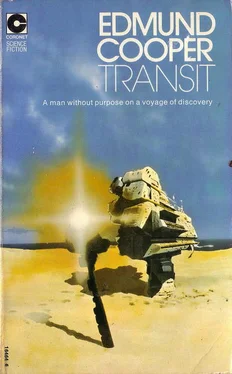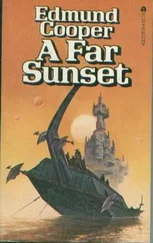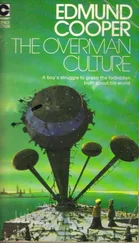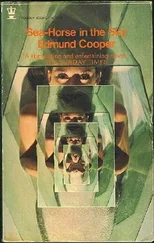‘Steady on, old man,’ said Tom hotly. ‘We’re in danger of getting just a shade personal.’
Avery began to laugh. ‘May I quote you,’ he gloated. ‘It’s the saying of the week.’
Without a word, and muttering as much dignity as possible, Tom stood up and began to walk away. Neither of them spoke all the way back to camp. Lunch was a very strained meal indeed. The two women, looking at them, suspected a major quarrel.
That evening, however, as he had said, Avery took Barbara along the beach. The evening was so warm that tfyey decided on a moonlight swim—still a novelty, when there were two moons to provide the light.
By the time they got back to the rock, Tom and Mary had retired. Barbara was surprised, because Avery had said nothing to her about the plot. In fact, he had said very little at all; and though she had tried to draw him on the assumed difference with Tom, his answers had been infuriatingly evasive.
Avery spotted two empty tumblers by the camp fire. He sniffed them with satisfaction.
‘If you’d like to turn in, I’ll take the first watch,’ he said to Barbara.
She was suspicious. ‘Something’s going on. What the hell is it?’
‘Nothing at all, my sweet. I’ll take the first watch. You get some sleep.’
‘Whatever we do, we do together,’ she said, firmly. ‘Something is happening. I want to know what.’
‘You’ll probably find out in the fullness of time…. Well, let’s go to bed anyway. Precautions can go to blazes for one night. The devil will look after his own.’
Yawning, but still mystified, Barbara raised no objection. It had been a long time since there had been any contact with the golden people. Presently, she and Avery went into their tent.
In the morning, a single glance at Mary was sufficient to tell both Barbara and Avery that something had indeed happened. She looked not conventionally radiant, as women are supposed to look on such occasions, but a little surprised, a little tired and vaguely smug.
Tom looked perplexed and obscurely proud.
Barbara, with her woman’s intuition, soon discovered what it was all about; and Avery already knew.
As he surreptitiously inspected them both with—as he thought—a somewhat clinical detachment, he felt a sudden shaft of envy, and guilt.
He was conscious of a great and complicated irony. He looked at Barbara, and saw that she, too, was envious. Suddenly, he wanted to hold her in his arms. But he didn’t. He pretended to notice nothing at all.
‘Physician,’ he murmured softly, ‘physician, heal thyself.’
About a week after what Avery privately called Tom and Mary’s Nuptial Flight, contact was made with one of the golden people—a woman. It seemed, in retrospect, a rather indecisive kind of contact; but at least it was a beginning. And, if nothing else, it should surely have demonstrated to the golden people that the occupants of Camp Two did not harbour any warlike intentions.
One afternoon Tom and Avery had wandered inland in search of a rather rare kind of fruit that had become a great favourite with all of them. It was an odd mixture of grapefruit and coconut—refreshing and satisfying. The ‘milk’ had a distinctly grapefruity flavour about it, and so did the ‘nut’ part, which was soft and rubbery and could be chewed as a kind of thirst-quenching chewing gum. Even the shell was useful, being hard but not britde. When it was dried in the sun, it made an almost non-porous bowl, several of which had now been added to the crockery supply at Camp Two.
If the fruit was peculiar, the tree on which it grew was even more peculiar. It stood on stilts—or rather dozens of long tough whitened roots that rose quite high from the ground, then curved in to join the short tree trunk. From a distance, the tree itself gave the impression of standing neatly on top of an old-fashioned bird-cage— about eight feet high.
Inevitably, the fruit came to be called bird-cage fruit. So far, Avery and Tom had only discovered half a dozen bird-cage trees. Another mysterious thing about them was that the ripe fruit seemed to disappear far more rapidly than could be accounted for by the occasional raids made to replenish the larder at Camp Two. The two men assumed that the fruit itself was probably attractive to various animals; and they had even considered devising ways of protecting ‘their’ crop.
But it was not the animals—or, at least, not wholly the animals—that had been reducing the supply, as they discovered when they returned to raid the largest tree they had found so far, and which was farther inland than the rest. It stood on a small patch of grassland; and because it was not restricted by the competition of other trees, its bird-cage was much wider and the dome formed by the roots was more flattened.
Climbing the bird-cage trees was a difficult busines: because the roots, though strong, were thin and slippery. Sometimes a foot would slip between the ‘bars’ of the cage. Then the climber had to force the roots apart and ease it out by himself, get someone to help him, or, if he was alone, slither cautiously back down the dome and hope that the gap between the roots at ground level would be wide enough for the foot to be pulled free.
That was what had happened to the golden woman: her foot had been trapped. But she was unlucky. The roots at the base on the side of the tree where she had been climbing were almost as close together as, and certainly much thicker than, they were higher up.
Tom and Avery found her sitting helplessly on the ground, a small cross-bow near by and, a yard or two away, a home-made basket on its side with two or three bird-cage fruit spilling out of it. Fortunately, they were quite a distance away when they spotted her. The woman’s immediate reaction was to wriggle towards her cross-bow (which must have been quite painful), snatch it and fit one of the short arrows that hung from it in a small quiver.
‘Down!’ shouted Avery—just in time. He and Tom flattened themselves in the thick grass, and almost simultaneously an arrow whisded a foot or two above Avery’s head.
‘Homicidal bitch!’ said Tom. ‘Harm can come to a young boy like this What the hell is she doing?’
‘She got her foot trapped in the roots.’
‘Serve her bloody right. Let’s leave her to stew. No doubt her boy friend will come looking for her if she doesn’t get home in time for dessert.’
Avery shook his head. ‘The opportunity is too good to miss. If we can help her, it might eventually register that we are friendly and harmless.’
‘Speak for yourself,’ said Tom, fingering his tomahawk lovingly. ‘Judging by what they did to Camp One, I bet these people don’t even have a word for friendship. .. .’ He laughed grimly. ‘Anyway, you’d look bloody silly trying to help her with three arrows stuck in your tummy.’
‘There’s a solution to that one,’ retorted Avery. ‘We make her use up all her ammunition.’ He raised himself on one knee, then immediately fell flat again. Another arrow whirred peevishly overhead.
Tom smiled. ‘She’ll catch on to it, then you’ll get out of phase and collect one.’
Avery shook his head. ‘Wriggle a bit farther away from me. It’s your turn this time.’
Tom let out a profanity; but he crawled a few yards to the right, raised himself and flopped back quickly. Another arrow came.
Avery waited a moment or two, then offered himself as a brief target. He hit the ground quickly; but no arrow came.
Tom then exposed himself once more, but again there was no arrow. ‘What did I tell you? She’s tumbled to it.’
‘We’ll see.’ Avery raised his head cautiously above the top of the grass.
The woman had an arrow fitted and ready, but she did not release it. Cautiously, Avery got up to his knees. Then the arrow came. He was lucky. It fouled in a high clump of grass and went veering off course. He hit the ground, with his heart thumping madly.
Читать дальше












